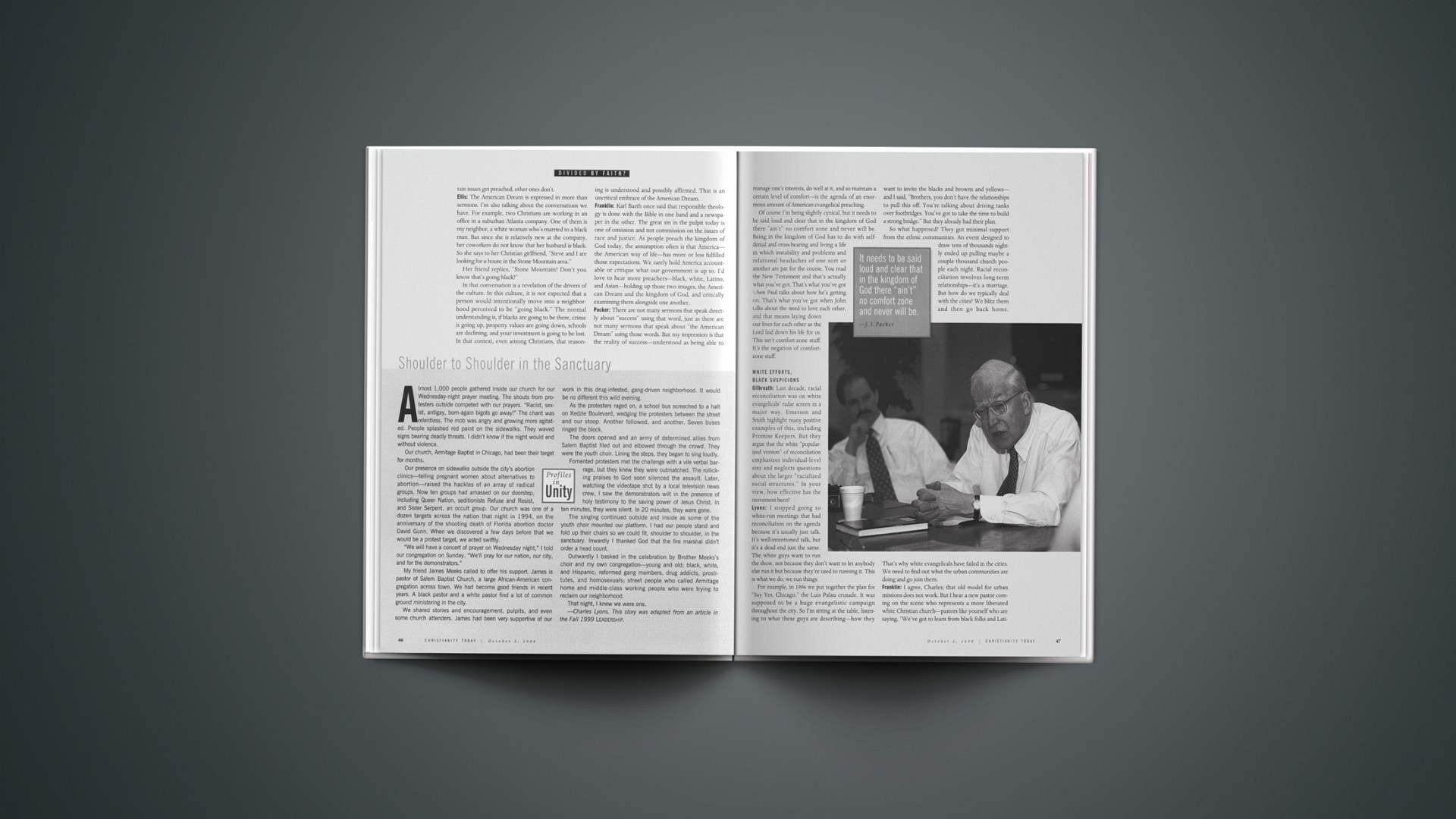Almost 1,000 people gathered inside our church for our Wednesday-night prayer meeting. The shouts from protesters outside competed with our prayers. “Racist, sexist, antigay, born-again bigots go away!” The chant was relentless. The mob was angry and growing more agitated. People splashed red paint on the sidewalks. They waved signs bearing deadly threats. I didn’t know if the night would end without violence.Our church, Armitage Baptist in Chicago, had been their target for months.Our presence on sidewalks outside the city’s abortion clinics—telling pregnant women about alternatives to abortion—raised the hackles of an array of radical groups. Now ten groups had amassed on our doorstep, including Queer Nation, seditionists Refuse and Resist, and Sister Serpent, an occult group. Our church was one of a dozen targets across the nation that night in 1994, on the anniversary of the shooting death of Florida abortion doctor David Gunn. When we discovered a few days before that we would be a protest target, we acted swiftly.”We will have a concert of prayer on Wednesday night,” I told our congregation on Sunday. “We’ll pray for our nation, our city, and for the demonstrators.”My friend James Meeks called to offer his support. James is pastor of Salem Baptist Church, a large African-American congregation across town. We had become good friends in recent years. A black pastor and a white pastor find a lot of common ground ministering in the city.We shared stories and encouragement, pulpits, and even some church attenders. James had been very supportive of our work in this drug-infested, gang-driven neighborhood. It would be no different this wild evening.As the protesters raged on, a school bus screeched to a halt on Kedzie Boulevard, wedging the protesters between the street and our stoop. Another followed, and another. Seven buses ringed the block.The doors opened and an army of determined allies from Salem Baptist filed out and elbowed through the crowd. They were the youth choir. Lining the steps, they began to sing loudly.Fomented protesters met the challenge with a vile verbal barrage, but they knew they were outmatched. The rollicking praises to God soon silenced the assault. Later, watching the videotape shot by a local television news crew, I saw the demonstrators wilt in the presence of holy testimony to the saving power of Jesus Christ. In ten minutes, they were silent. In 20 minutes, they were gone.The singing continued outside and inside as some of the youth choir mounted our platform. I had our people stand and fold up their chairs so we could fit, shoulder to shoulder, in the sanctuary. Inwardly I thanked God that the fire marshal didn’t order a head count.Outwardly I basked in the celebration by Brother Meeks’s choir and my own congregation—young and old; black, white, and Hispanic; reformed gang members, drug addicts, prostitutes, and homosexuals; street people who called Armitage home and middle-class working people who were trying to reclaim our neighborhood. That night, I knew we were one. Charles Lyons. This story was adapted from an article in the Fall 1999 Leadership.
Related Elsewhere
Read the 1999 Leadership article from which Lyons’s story was adapted.Visit the Armitage Baptist Church site, where you can read more about Lyons .Don’t miss the other articles from our weeklong series on racial reconciliation:Common Ground in the Supermarket | A profile in racial unity. (Sept. 27, 2000) The Lord in Black Skin | As a white pastor of a black church, I found the main reason prejudice and racism hurt so much: because we are so much alike. (Sept. 25, 2000) Divided by Faith? | A recent study argues that American evangelicals cannot foster genuine racial reconciliation. Is our theology to blame? (Sept. 22, 2000) Color-Blinded | Why 11 o’clock Sunday morning is still a mostly segregated hour. An excerpt from Divided by Faith. (Sept. 22, 2000)Other Christianity Today stories about social justice include:Mighty to Save | The gospel is holistic, serving as a change agent for social justice and penetrating the realm of body, mind, and soul or spirit. (Feb. 11, 2000) CT Classic: Confessions of a Racist | (Jan. 17, 2000) Martin Luther King, Jr.: A History | No Christian played a more prominent role in the century’s most significant social justice movement than Martin Luther King, Jr. (Jan. 17, 2000)
Copyright © 2000 Christianity Today. Click for reprint information.










